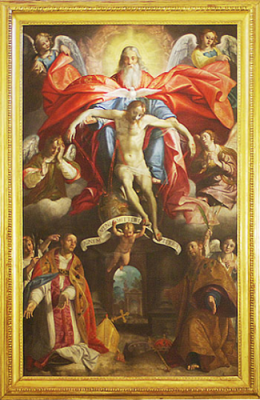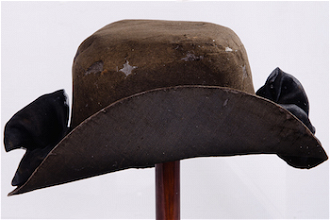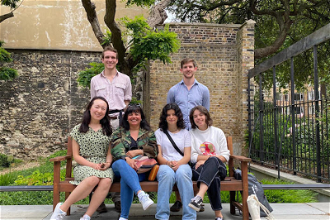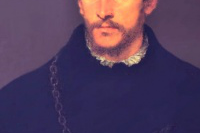Plymouth: Pastoral Message for Canonisation of 40 Martyrs of England & Wales anniversary

The Martyrs' Picture by Durante Allberte, English College, Rome
Rt Rev Mark O'Toole, Bishop of Plymouth, writes:
Dear Friends,
This weekend we mark an historic moment - the fiftieth anniversary of the Canonisation of the forty martyrs of England and Wales, which took place on 25th October 1970. On that occasion, Pope Paul VI reminded us:
"We have among the 40 holy Martyrs secular and regular priests, religious of various orders, and of different rank, lay people of very noble descent, as well as of modest condition; we have women who were married, mothers with a family. What unites them all is that interior attitude of fidelity to the call of God asked of them, as an answer of love…….The drama of the existence of these martyrs, was that their honest and sincere loyalty to the civil authority came to be in conflict with fidelity to God and with what, according to the dictates of their conscience illuminated by the Catholic faith, they knew to involve the revealed truths, especially to the Holy Eucharist and on the inalienable prerogatives of the successor of Peter, who, at the behest of God, is the universal Pastor of the Church of Christ." (Pope Paul VI, Homily at the Canonisation of the Forty Martyrs)
We are especially blessed to have one of these Martyrs, St Cuthbert Mayne, as one of our Patrons. He was born and grew up in North Devon and ministered as a priest in Cornwall. He was captured there in 1577 and imprisoned in Launceston Castle for several months before being hung, drawn and quartered in the Market Square on 29th November 1577. He is known as "the protomartyr", or first, of the "Martyrs of Douai", some 158 priests who, over a period of a hundred years, were formed for the priesthood at the College of Douai, in France, and who then surreptitiously returned to this country, to minster to the Catholic faithful in secret. When caught, they usually ended up on the scaffold, many of them inspiringly testifying to the truth of their faith, and at the same time, pledging their loyalty to the King or Queen.
We know that one of the pieces of evidence that unjustly condemned St Cuthbert to death was the possession of an Agnus Dei. This was a symbol of his priestly office, which he wore around his neck, consisting of the image of the Lamb of God, sealed upon a piece of wax which had come from the Paschal candle blessed by the Pope. It was not only a tangible link to Cuthbert Mayne's communion with the Holy Father, but also points to the sacrifice of the innocent lamb, Jesus Christ, who went to death on the Cross.
Today, as we keep the memory of this great and well-loved saint, we see where his martyrdom can be truly rooted. It is founded on the death of Jesus, on His supreme sacrifice of love, consummated on the Cross, that we might have life (cf. Jn 10: 10). It is these two truths - the sacrifice of Jesus manifest anew in the sacrifice of the Mass and communion with the Holy Father - for which he and so many others died. These two truths have, for many centuries, been the hallmarks of the Catholic Faith in these islands.
St Cuthbert's strength to face martyrdom, came from his deep and intimate union with Jesus Christ. We know that in the months he spent in the dark prison cell in Launceston Castle, before his death, St. Cuthbert never lost heart. He spent his long wait by encouraging his fellow prisoners. He often fell on his knees to say his prayers, which lasted far into the night. On one occasion, just after midnight, it is recorded, St. Cuthbert was meditating and praying, and suddenly a bright light shone around him, lighting up the terrible wall of the dungeon. It awakened the other prisoners who wondered where the light was coming from. St. Cuthbert gently told them to go back to sleep and would not talk about it the following day. A miraculous consolation had been given to him in his dismal dungeon. Indeed, the Holy Spirit was preparing him for an eloquence beyond human speech.
That eloquence came in the manner of his death. "In manus tuas, Domine…Into your hands Lord". These were the final words he prayed from the scaffold of his execution, his final pulpit. We know they were words prayed by St Stephen, protomartyr of the whole Church, who himself was mirroring the words prayed by Our Lord on the Cross.
They are words with which we are justly consoled at this time, as our world continues to battle with this deadly virus. There is much which could make us feel as though our world is shrouded in gloom, at this moment. We may often feel like that ourselves. When the fear of the present, or of what is to come, seems to overwhelm us, it is into the hands of the Lord that we entrust ourselves. May we have the courage and fidelity that St Cuthbert and the martyrs had. May we, too, experience the light and consolation which only the Holy Spirit can give.
At the same time, let us draw close to the gift of the Mass. If we are able and well enough, and do not have to shield, let us make every effort to be physically present once more at the holy sacrifice of the Mass, in our churches, on a weekday, if not on a Sunday. We can do so safely, whilst observing all the necessary protocols that need to be in place.
I conclude with some further words from Pope Saint Paul VI:
"These heroic sons and daughters of England and Wales took their faith seriously; this means that they accepted it as the only norm of their life and of their whole conduct, portraying a great serenity and a profound spiritual joy. With a freshness and spontaneity not without that precious gift that is the typical mood of their people. The Church and the world today have the greatest need of such men and women, of every state of life: priests, religious and laity, because only people of such stature and holiness will be able to change our tormented world and to give that spiritual and truly Christian orientation to which every person intimately yearns - even sometimes without being aware of it - and of which we all so much need". (Pope Paul VI, Homily at the Canonisation of the Forty Martyrs)
St Cuthbert Mayne…. Pray for us.
Martyrs of our country…. Pray for us.
Please pray for me.
Yours devotedly,
Rt Rev Mark O'Toole
Bishop of Plymouth
LINK
The Forty English Martyrs - www.indcatholicnews.com/saint/132


















